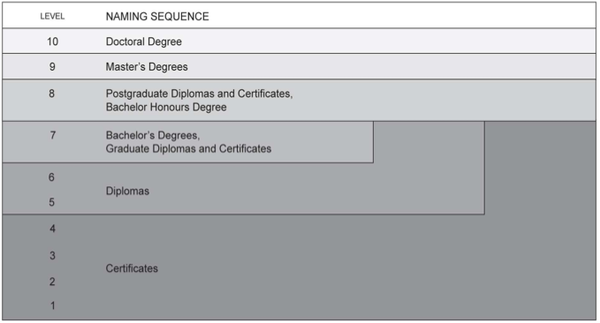The qualifications framework
| Learning and Teaching in Practice | |
|---|---|
| Module 3: Teaching context and learning design | |
| Quality assurance | Introduction | Tertiary education in NZ | The qualifications framework | Quality assurance approaches | Quality assurance in education | Summary |
Contents
Overview of the qualifications framework
|
Emilia's new Public Health Policy course is part of a degree programme which has been approved by NZQA. To gain approval, the institution needs to show that the content is relevant and meets the needs of stakeholders. In addition, NZQA has defined subject categories and levels, and every approved programme needs to fit within these. Emilia will need to ensure her new course fits into NZQA's 'framework' of categories and levels. |
|
Brett's carpentry qualification is also NZQA-approved, so he must ensure his revised course is consistent with the framework.
|
Let's look at the framework in more detail:
The New Zealand Qualifications Framework (NZQF) is a register of the qualifications recognised by NZQA. Key underlying principles of the NZQF include:
- Modularity
- Each qualification comprises one or more components (eg unit standards) which are combined to create coherent qualifications. The same component may be used in a number different courses.
- Portability
- If a learner achieves one of these components as part of a qualification, it will be recognised nationally and may be credited towards any other qualification in which it is also a component.
- Standards-based qualifications
- Each qualification and its components state learning outcomes and standards for assessing learner achievement. Depending on the context, these may also be called elements and performance criteria respectively.
NZQF qualifications
- Titles
- THE NZQF spells out clear rules for acceptable titles according to the type of qualification. Common qualification types include certificates, diplomas and degrees- at undergraduate and postgraduate levels.
- Credits
- Each qualification (and each component) includes a credit value. 1 credit equates to around 10 hours of total learning time, so a 5-credit course will involve learners in around 50 hours of learning time. This will include face-to-face study (eg in a classroom) as well any self-directed, online or other learning.
- Levels
- Each qualification (and each component) has a defined level. Each NZQF level corresponds to a level of complexity and autonomy in learner performance.

|
Emilia's Public Health Policy course is defined as level 7 (corresponding to year 3 of an undergraduate degree). As such, it should incorporate:
Source: The New Zealand Qualifications Framework (see link below.) Emilia will need to ensure the learning outcomes for her course require these types of learner performance. |
|
Brett's carpentry qualification mostly comprises components at level 4. He will need to make sure any revised learning outcomes will incorporate:
Source: The New Zealand Qualifications Framework (see link below.)
|
|
Programme approval and accreditation
Only programmes approved by NZQA can be registered on the NZQF. For the programme to be approved, the developer must submit detailed documentation of the course and its components, and show that it has been developed and supported by stakeholders such as industry or a professional body.
Any provider that wants to deliver an approved programme must be accredited by NZQA. The provider must submit detailed documentation showing that they have the capability (eg staffing and other resources) to deliver the programme effectively.
|

